
Полная версия:
William Pitt the Younger: A Biography


WILLIAM PITT
THE YOUNGER
WILLIAM HAGUE

DEDICATION
For my mother and father,
who have passed on to me
their reverence for books
CONTENTS
Cover
Title Page
Dedication
Family Tree
Map: French Satellites and French Conquests, 1792–1805
Prologue
PART ONE
1 Elder and Younger
2 Cambridge and the World
3 Ambition on Schedule
4 Brilliant Beginnings
5 Death of Two Governments
6 The Youngest Chancellor
7 Brief Exuberance
8 From Plotter to Prime Minister
9 The Struggle for Supremacy
PART TWO
10 Power and its Limits
11 Private by Nature
12 Spreading His Wings
13 Insanity and Crisis
14 Trials of Strength
15 The Cautious Crusader
16 The View from the Precipice
PART THREE
17 A Tutorial in War
18 Frustrations of Supremacy
19 Insurmountable Obstacles
20 Breaking Point
21 Caution to the Winds
22 The Dashing of Hope
23 Resignation with Hesitation
PART FOUR
24 The Limits of Magnanimity
25 The Old Addiction
26 Back, But Never the Same
27 Too Many Enemies
28 ‘How I Leave My Country’
Notes
Bibliography
Index
Acknowledgements
About the Author
Praise
Other Works
P.S. Ideas, interviews & features …
About the Author
About the Book
Read On
Copyright
About the Publisher
FAMILY TREE
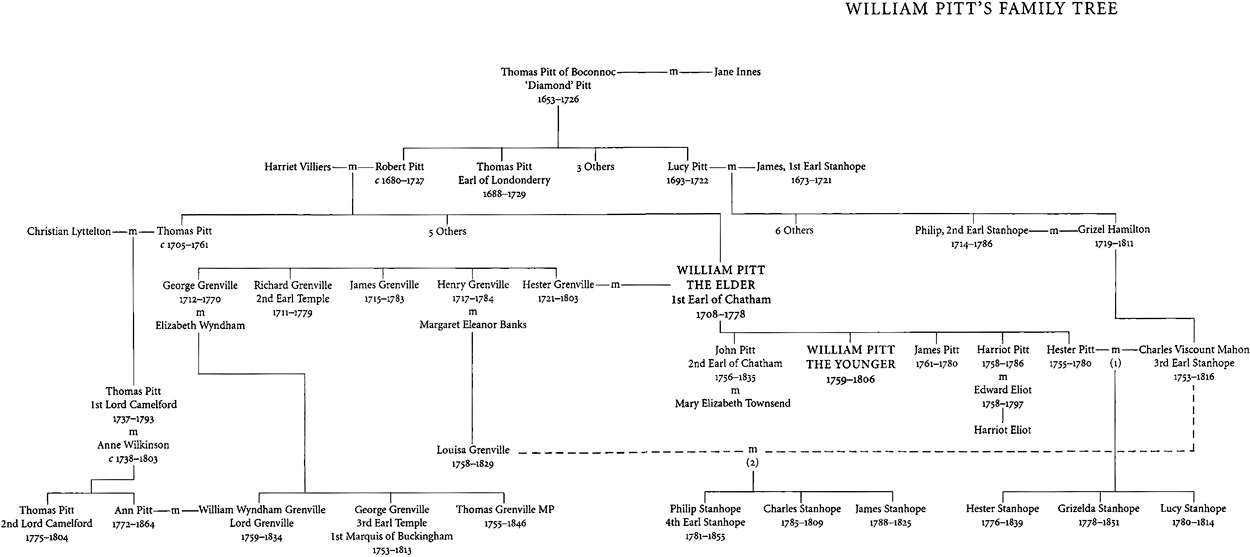
MAP: FRENCH SATELLITES AND FRENCH CONQUESTS, 1792–1805
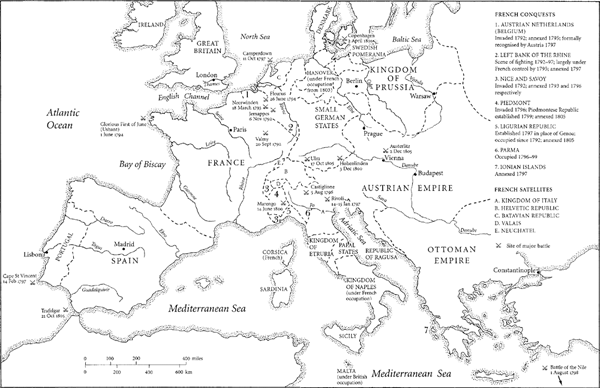
PROLOGUE
On the morning of Tuesday, 9 June 1778 huge crowds gathered in the centre of London. People came in their tens of thousands, despite the pouring rain, to line the streets and windows around the old Palace of Westminster. ‘The concourse of people assembled’, wrote one of the following morning’s newspapers, ‘was beyond belief: the windows of all the houses, and even tops of some were crowded; as were the streets, though the spectators had been not only exposed to the rain for several hours, but to stand in dirt and wet nearly to the ankles …’1
From the entrance to Westminster Hall in New Palace Yard, through Parliament Street, Bridge Street, King Street and then the Broad Sanctuary outside the Great West Door of Westminster Abbey, they waited for hours; some noisily, regarding it as ‘a scene only of festivity’, some quietly, as they ‘indulged a patriotic sigh to the memory of their country’s protector’.2
At two o’clock in the afternoon those with a view of the North Door of Westminster Hall saw the procession emerge. First the High Constable of Westminster, then the messenger to the College of Arms in a mourning cloak, soon afterwards seventy poor men in cloaks with black staves in their hands, then a Standard, then a long line of servants. Eventually came a great banner and a coronet on a black velvet cushion and then the coffin, covered in a black velvet pall, adorned with the Arms of the deceased and borne by eight gentlemen.
The previous day an estimated hundred thousand people had filed through the black-draped Painted Chamber of the Palace to see the same coffin lying in state. For these were the remains of the Earl of Chatham, known to a previous generation before his ennoblement as ‘the Great Commoner’, and to a later generation accustomed to the fame of his son as the elder Pitt. He had ended his turbulent and unpredictable career with the most dramatic possible exit, collapsing in the House of Lords while denouncing the mismanagement of the war with America, and had died in May, a month later. He had been a dominating figure, the great political leader of his time. Whatever mixture of curiosity, gregariousness and reverence had brought vast numbers to line the route of his funeral procession, there is no doubt that every single one of them knew something of his life, achievements and opinions.
Among his contemporaries, the elder Pitt had excited every feeling from adoration to contempt. To the court of King George III, already in the nineteenth year of what would be a sixty-year reign, Chatham was impudent, unreliable and inconsistent. He had switched royal patrons in the 1740s out of opportunism, had been unable to work with the King’s favourite Minister in the 1760s, and having schemed for years to return to office and regain his power, had retreated into hypochondria and depression once he was back. In the 1770s he had opposed the war with America, giving moral support to a colony in full rebellion, and had heaped scorn on the policies and Ministers of His Majesty. To the King he had been ‘a snake in the grass’,3 and to other critics he was guilty of ‘prevarication, self-contradiction, disregard of truth, mad ambition, mean popularity, pride, and the most intemperate passion’.4 Few tears would be shed at Windsor, or among the supporters of the increasingly embattled administration of Lord North, that this powerfully persuasive voice was now forever silent.
Yet to many others this man who had so offended the King was the greatest figure in politics in their lifetimes, a man who had rescued an outnumbered nation from military defeat and vanquished her enemies, particularly the French, in the Seven Years’ War, the greatest war they had ever known. To them he was ‘that great and glorious Minister, who, to all succeeding ages, will be quoted as an illustrious example, how one great man, by his superior ability could raise his drooping country from the abyss of despair to the highest pinnacle of glory, and render her honoured, respected, revered, and dreaded by the whole universe’.5 It was Chatham alone, they said, who had given direction, and a sense of purpose, and aggression to Britain’s war effort; Chatham who produced the great ‘year of victory’ of 1759, when Horace Walpole had written ‘our bells are worn threadbare with ringing of victories’.6 Thus Chatham was revered as a brilliant maker of war, who had brought Canada and India under British dominion, yet he was also supported as a far-sighted man of peace by the opposition politicians, led by the great Whig magnate the Marquis of Rockingham, who now proceeded to the Abbey. For it was Chatham too who had pointed with wisdom and clarity to the folly of the war in America.
The bitter controversies of Chatham’s lifetime had led to contrasting, and to simple observers confusing, approaches to his death. As the procession wound its way to Westminster Abbey the crowds must have wondered whether or not this was really meant to be a grand state occasion. The House of Commons had voted unanimously for a public funeral, a huge monument in the Abbey and the paying off of Chatham’s substantial debts. The Corporation of London, ever devoted in its support for him, had unsuccessfully petitioned the King to permit his burial in St Paul’s. Yet the House of Lords had voted against attending the funeral as a House, and there is no doubt that ‘the greatest influence was made by the Court to prevent the members of either House attending the funeral’.7 As a result the funeral arrangements were a compromise, a public procession without the pomp and pageantry which only the state was able to provide. Many onlookers would be disappointed, with the Morning Post commenting: ‘The funeral procession was allowed, on all hands, to be a very pitiful pageant, considered as a national one; for instead of having a platform erected for it from Westminster Hall to the Abbey, as is usual in such cases, the attendants were obliged to wade through the mud, preceded by half a dozen scavengers with their brooms!’ ‘It is rather remarkable’, the paper went on to point out, ‘that St Martin’s bells were ringing a merry peal during the interment of the late patriotic Earl.’8
The London Evening Post made a similar complaint: ‘The most scandalous parsimony prevailed, and every mark of disrespect was shown to those members who did attend. Not half the quantity of cloaks, scarfs, or hatbands were provided – great complaints were made but the answer, was, “it would have been too expensive to have furnished more.” Colonel Barré justly observed, “it is not a reign to complain in”.’9 Chatham had evidently complained too much.
Those who thought they would see the parliamentary leaders assembled en masse found instead only about forty peers and twenty MPs among the many hundreds of people attending the ceremony. There was Rockingham, the foremost opposition politician; there Edmund Burke, his right-hand man; there General Burgoyne, the soldier turned opposition MP – but they were there ‘more to vex the King’s Ministers than to honour the memory of the Earl’.10 Only one member of the government was present, Lord Amherst, who had commanded the army under Chatham, and only one member of the Royal Family, the Duke of Gloucester, the King’s estranged younger brother. There were no Sheriffs, no Masters in Chancery in their gowns, no judges or Privy Councillors. The Lord Mayor was missing, as was the Speaker of the House of Commons, and there was not ‘a sufficient number of Baronets to walk by themselves’.11
Still, the crowds had witnessed a solemn procession and a major event. Some of them might even have noticed the Chief Mourner, walking behind the coffin, the late Earl’s second son, another William Pitt. On his left was his brother-in-law, Lord Mahon, and on his right his uncle, Thomas Pitt. With his mother choosing to stay at home rather than grieve in public and his elder brother at sea on the expedition to reinforce Gibraltar, the nineteen-year-old William performed his first public duty, walking behind the coffin of the father who had doted on him. That night he wrote to his mother:
Harley Street
June 9th, 1778
My Dear Mother
I cannot let the servants return without letting you know that the sad solemnity has been celebrated so as to answer every important wish we could form on the subject. The Court did not honour us with their countenance, nor did they suffer the procession to be as magnificent as it ought; but it had notwithstanding everything essential to the great object, the attendance being most respectable, and the crowd of interested spectators immense. The Duke of Gloucester was in the Abbey. Lord Rockingham, the Duke of Northumberland, and all the minority in town were present … All our relations made their appearance … I will not tell you what I felt on this occasion, to which no words are equal; but I know that you will have a satisfaction in hearing that Lord Mahon as well as myself supported the trial perfectly well and have not at all suffered from the fatigue …
I hope the additional melancholy of the day will not have been too overcoming for you, and that I shall have the comfort of finding you pretty well tomorrow. I shall be able to give you an account of what is thought as to our going to Court.
And I am ever, my dear Mother, your most dutiful and affectionate son,
W Pitt12
Less than twenty-eight years would pass before William Pitt’s own body would join that of his father beneath the same dark stone slab in the North Transept of Westminster Abbey. In that time, he would equal his father’s fame and popularity while far exceeding his domination of politics and his endurance in office.
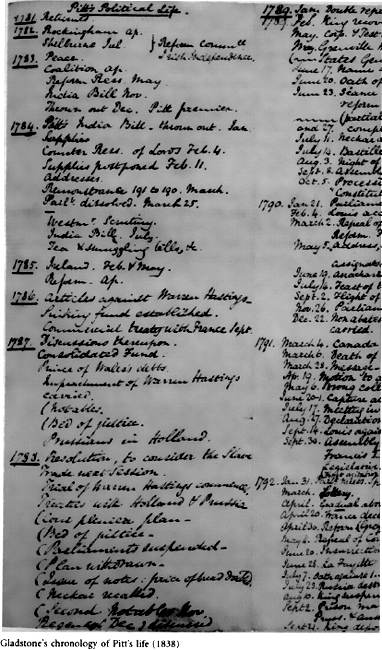
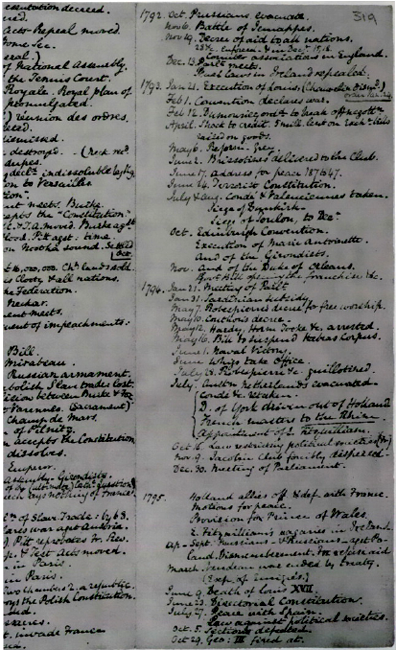
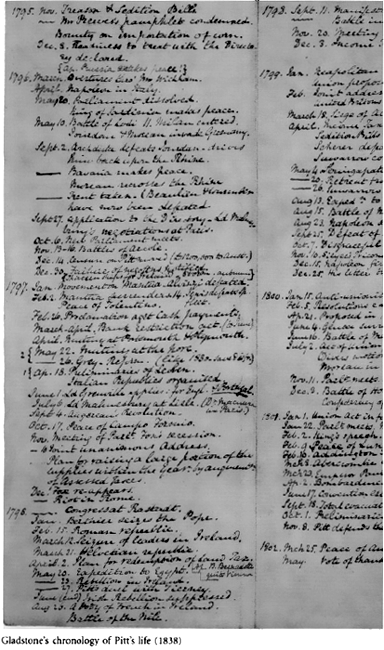
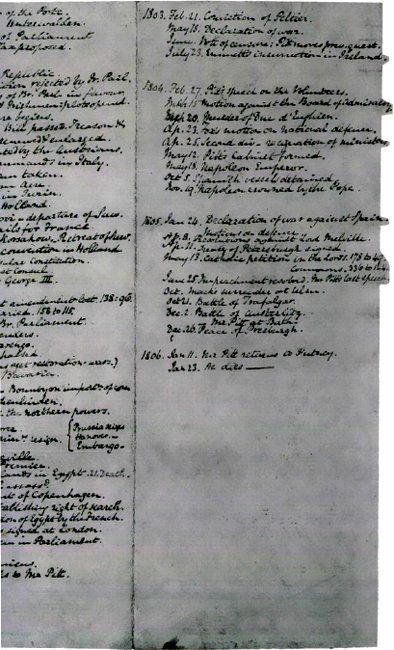
Gladstone’s chronology of Pitt’s life (1838)
1 Elder and Younger
‘There never was a father more partial to a son.’
WILLIAM WYNDHAM GRENVILLE1
‘He went into the House of Commons as an heir enters his home; he breathed in it his native atmosphere, – he had, indeed, breathed no other; in the nursery, in the schoolroom, at the university, he lived in its temperature; it had been, so to speak, made over to him as a bequest by its unquestioned master. Throughout his life, from the cradle to the grave, he may be said to have known no wider existence. The objects and amusements, that other men seek in a thousand ways, were for him all concentrated there. It was his mistress, his stud, his dice box, his game-preserve; it was his ambition, his library, his creed. For it, and it alone, had the consummate Chatham trained him from his birth.’
LORD ROSEBERY2
IT WOULD SCARCELY BE POSSIBLE to imagine a more intensely political family than the one into which William Pitt was born on 28 May 1759. On his father’s side, his great-grandfather, grandfather and uncle had all been Members of Parliament. His father, twenty-five years an MP, was now the leading Minister of the land. On his mother’s side, that of the Grenville family, one uncle was in the House of Lords, and two others were in the Commons, one of them to be First Lord of the Treasury by the time the infant William was four years old. An understanding of Pitt’s extraordinary political precocity requires us to appreciate the unusual circumstances of a family so wholeheartedly committed to political life.
It was in the year of William’s birth that the career of his father, still also plain William Pitt, approached its zenith. Three years into what would later be known as the Seven Years’ War, in which Britain stood as the only substantial ally of Prussia against the combined forces of France, Austria, Russia, Saxony and Sweden, the elder Pitt had become the effective Commander-in-Chief under King George II of the British prosecution of the war. In his view the war had arisen from ‘a total subversion of the system of Europe, and more especially from the most pernicious extension of the influence of France’.3 He was not nominally the head of the government, the position of First Lord of the Treasury being held by his old rival the Duke of Newcastle, but he was the senior Minister in the House of Commons. Through his powerful oratory he dominated both Parliament and the Ministry, and was acknowledged as the effective leader of the administration. As Newcastle himself said in October of that year: ‘No one will have a majority at present against Mr. Pitt. No man will, in the present conjuncture, set his face against Mr. Pitt in the H. of Commons.’4
From taking office at the age of forty-eight in 1756 as Secretary of State for the Southern Department,* with a brief interruption of two months during the Cabinet crisis of 1757, Pitt had become the principal source of ministerial energy in both organising for war and in preparing a strategy for Britain to do well out of it. It was Pitt who gave detailed instructions on the raising and disposition of the troops and the navy, and Pitt who insisted on and executed the objective of destroying the empire of France. As the French envoy, François de Bussy, was to complain to the leading French Minister the Duc de Choiseul after meeting Pitt in 1761: ‘This Minister is, as you know, the idol of the people, who regard him as the sole author of their success … He is very eloquent, specious, wheedling, and with all the chicanery of an experienced lawyer. He is courageous to the point of rashness, he supports his ideas in an impassioned fashion and with an invincible determination, seeking to subjugate all the world by the tyranny of his opinions, Pitt seems to have no other ambition than to elevate Britain to the highest point of glory and to abase France to the lowest degree of humiliation …’5
It was in 1759 that Pitt, previously dismissed as a rather unpredictable politician with a distinctly chequered career, came to be regarded as the saviour of the nation. His insistence on fighting a European war with offensives elsewhere – in America, the Caribbean, Africa and on the oceans of the world – was crowned with success within months of the birth of his second son, William. Instead of having to face the French invasion feared throughout much of the year, Britain celebrated a stream of military successes that summer and autumn: victory at Minden in Germany in August, the storming of Quebec which shattered French rule in Canada in September, the simultaneous news of victories which reinforced British dominance of India, and then the defeat and scattering of the French fleet at Quiberon Bay in November. These events brought about a change in the public perception of the elder Pitt, analogous to the regard in which Churchill was held after 1940 compared to the controversy which previously surrounded him. From then on there was a sense of reverence, sometimes of awe, towards him, both on parliamentary occasions and among the wider public. Tall, haughty, but always eloquent, he was the great orator and war leader who had placed himself beyond party gatherings and factions to be at the service of the nation. The young William, as he became conscious of the people and events around him, would know only a world in which his father was treated as a legend.
Such renown was a far cry from the frustrated ambitions of earlier generations of Pitts. Being a younger son, the elder Pitt had enjoyed little in the way of financial inheritance, but his ancestors and relatives had been well connected and often very wealthy for the previous century and a half. Pitt’s forebears had included prominent and sometimes wealthy officials under Elizabeth I and James I, but it is Thomas Pitt of Bocconoc (1653–1726) who brings the family story to life. He was the buccaneering ‘Diamond Pitt’ who went to India and made a fortune in probably illegal competition with the East India Company, came back and purchased English property with it, including the medieval borough of Old Sarum,* and then returned to India on behalf of the Company as Governor of Madras. While there, he bought a 130-carat diamond for £25,000 which he hoped to sell to one of the European royal families for at least ten times as much. Returning to Britain during the War of the Spanish Succession (1702–1713), he discovered that European royalty was otherwise preoccupied, but eventually sold the diamond at a substantial but much smaller than expected profit to the Regent of France. With this and other earnings from his exploits in India, Thomas Pitt set about buying more estates, particularly in Cornwall. He was part of a new and often resented breed of rich men who came back from the East to buy property and parliamentary influence at home. He used his wealth to help all five of his children on their way in life, particularly the eldest son, another Thomas Pitt, who kept most of the family wealth and became Earl of Londonderry. A younger son, Robert Pitt, was put into Parliament for Old Sarum in 1705, for which he sometimes sat alongside his father. Robert Pitt was undistinguished, came close to disaster by being on the fringes of Jacobite attempts to overthrow the new Hanoverian dynasty, and died young, but not before fathering six children, the fifth of whom was William Pitt, the future Earl of Chatham. Once again the eldest son was a Thomas Pitt, who after much litigation and family dispute ended up with the lion’s share of the family wealth.
The family lived at Stratford-sub-Castle near Salisbury, but at the age of ten William was sent with his eldest brother Thomas to Eton, an experience which proved decisive in his later determination to educate all of his own children at home. He remarked much later to the Earl of Shelburne that he ‘scarce observed a boy who was not cowed for life at Eton; that a publick school might suit a boy of a turbulent forward disposition, but would not do where there was any gentleness’.6
It seems that Robert Pitt had intended William for the Church, but William himself had other ideas, joining the army at the lowest officer rank in the cavalry, as a Cornet of Dragoons. He never saw active service, since the long-serving Whig Minister Robert Walpole did an effective job of keeping Britain out of various international disputes at the time, but he took the opportunity to travel to the Continent on a modest version of the Grand Tour through France, Switzerland and Holland. This was the only time he left his native country; an eighteenth-century political career did not require extensive travel. Like his son, he was later to dispose of huge forces, alliances and treaties around the globe, while only once in his life leaving the shores of Britain. He was clearly determined to continue the emerging Pitt tradition of serving in Parliament, and was duly elected for the family borough of Old Sarum in the general election of 1734, but only after some acrimony when his brother Thomas suggested giving the seat to the sitting Member, with financial compensation for William instead.
Although Pitt seems to have been well disposed towards Walpole and the Whigs at the time he was elected, he soon fell in with key figures in the opposition, notably Lord Cobham, his ex-Colonel, and Prince Frederick, the Prince of Wales. The relationship between Prince Frederick and his father King George II was an early example of a noted Hanoverian tradition, being one of unmitigated hatred between monarch and heir. The Prince of Wales was truly loathed by both his father and mother. Queen Caroline once exclaimed when she saw the Prince pass her dressing-room window: ‘Look, there he goes – that wretch! that villain! – I wish the ground would open this moment and sink the monster to the lowest hole in hell!’7 Such loathing was exacerbated when the King’s adoption of a Hanoverian mistress became public knowledge, so helping to make the Prince the more popular member of the Royal Family. Pitt, as a young MP and army officer, became part of the Prince’s circle, with some of his early parliamentary speeches being unmistakably toadying towards the Prince. He became a regular opponent of Walpole, and was dismissed from his position in the army as a result.



